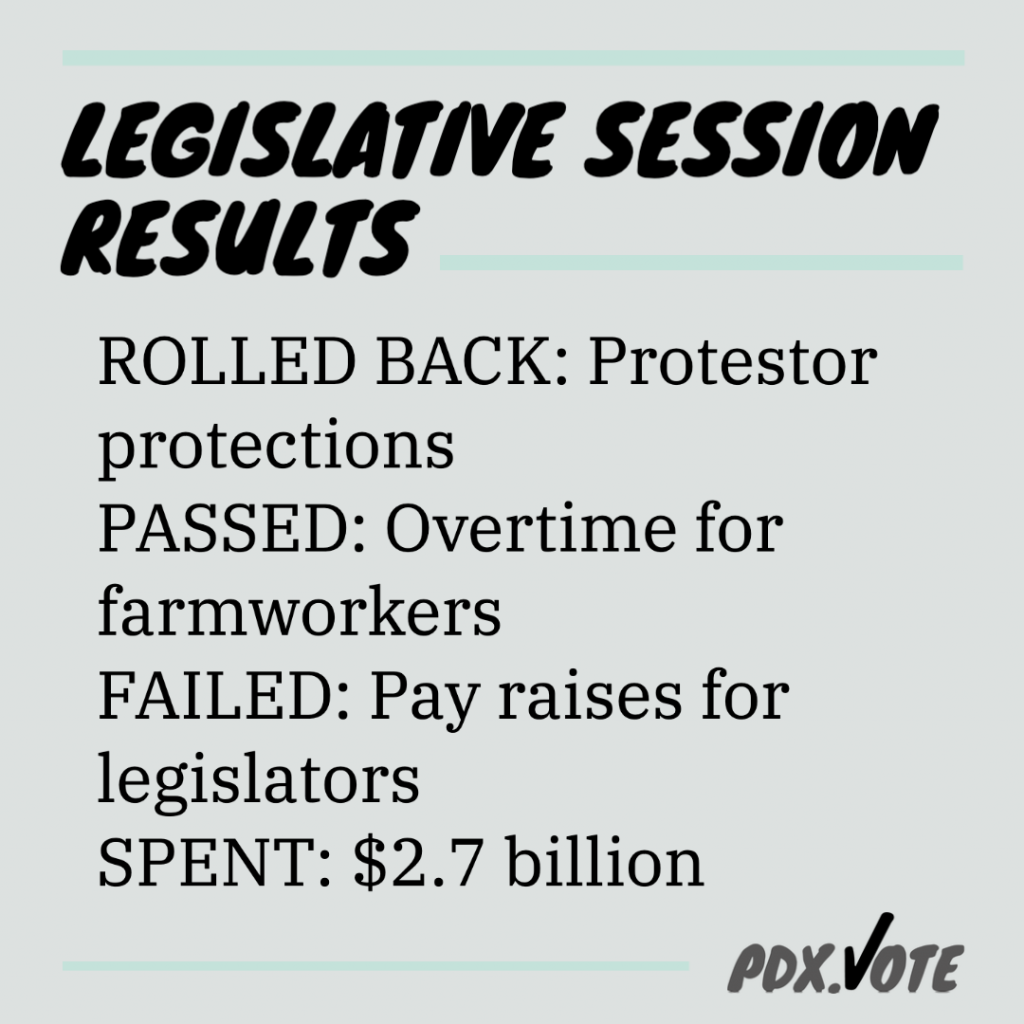
Lots of last minute action
Starting last Thursday, state legislators voted on more than 60 bills still under consideration. They finished before noon on Friday and Senate President Peter Courtney gaveled out his last regular session before his planned retirement at the end of his term. The deadline to finish all legislative work is today, March 7 — the state legislature actually finished their work three days early.
Most of the bills discussed below are still waiting for Governor Kate Brown’s signature to become law. At the time of writing this article, Brown has signed ten bills passed by the state legislature during this session.
Results of the short session
- Budget expansion: State legislators added almost $2.7 billion to the state budget passed last year. Of that money, $400 million will go to building affordable housing and support services for folks without access to stable housing. $180 million has been set aside to send one-time payments to more than 250,000 state residents dealing with financial fallout from the ongoing pandemic.
- Overtime for farmworkers: The state legislature passed HB 4002, by far the most contentious bill in this session. In its final form, overtime pay requirements will be phased in over the next five years. The State of Oregon will give tax credits to farmers for the next six years, as well as provide grants or loans to aid farmers in paying overtime. In 2027, farmworkers can expect overtime pay when they work more than 40 hours in a week.
- Minimal checks on police: After moving the content of HB 4131 into an amendment to HB 4008 and avoiding public hearings, the state legislature voted in favor of rolling back controls on when police can use chemical weapons and munitions on protesters. Those protections were hard won during protests in 2020 and 2021 and only went into effect last year. In the meanwhile, many Portland residents are dealing with long-term impacts to their respiration and reproduction systems. Some protesters have needed multiple surgeries to manage injuries caused by these munitions and the City of Portland seems to settle a lawsuit around PPB’s use of force against protesters every other week. SB 1510 passed, which prevents police from pulling over drivers with just one light out and theoretically should reduce racial injustices in the carceral system.
- Mixed messages on incarceration: SB 1584 passed and will provide a system to settle with Oregon residents who are imprisoned for crimes they’re later proven to have not committed. At the same time, though, the state legislature dropped a bill that would have provided new trials to people who are incarcerated because on non-unanimous jury verdicts (which the U.S. Supreme Court deemed unconstitutional). There’s an estimated 250 people incarcerated in Oregon currently who would have had a chance at a new trial under the bill, and some of them may be eligible for a settlement under the system established by SB 1584 — if they can ever get a new trial.
- No raise for legislators: The state legislature voted down a potential raise, so both chambers are likely to continue to attract candidates who can afford to pay for their own campaigns or who will rely on funds from big donors. Three Democratic state representatives announced that they will not run for re-election because they can’t live on a legislator’s salary and the work is difficult to balance with another job. All three are women: Anna Williams, Karin Power, and Rachel Prusak. In their joint resignation letter, they noted, “We continue to perpetuate systems that leave Black, Indigenous, Latinx and women legislators behind. Most people cannot afford to even consider this job…If this system is built for the financially well-off or the retired, will it ever work for you? What interests does this current structure serve?”
- Odds and ends: Gasoline stations will remain full service. Greyhound racing is banned statewide. Mattress prices will go up to fund a program to properly dispose of old mattresses. Trained city employees will be allowed to review speed camera photos, rather than requiring that all reviews be done by sworn police officers. The state will fund universal representation for Oregon residents facing immigration proceedings.
Special legislative sessions seem likely
The Oregon state legislature convened multiple special sessions in 2020 and 2021. This year will likely be the same — there are multiple issues that could prompt reconvening the legislature. The statewide public defender shortage, for example, needs action beyond the mere $13 million the state legislature threw at the system during the regular session.
However, any special sessions later this year may be complicated by the election schedule. Between redistricting, retirements, and other change ups, we can expect at least 20 legislators to be winding down their work by the end of the May primary. And by November, we’ll know who will make up next year’s state legislature. Those legislators on their way out will struggle to pass bills.
